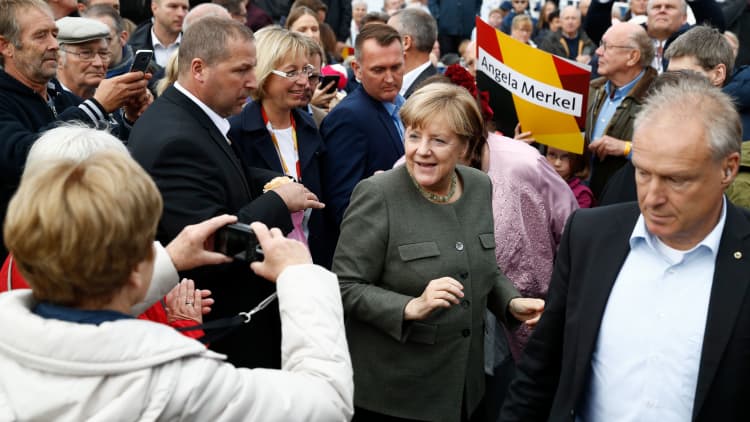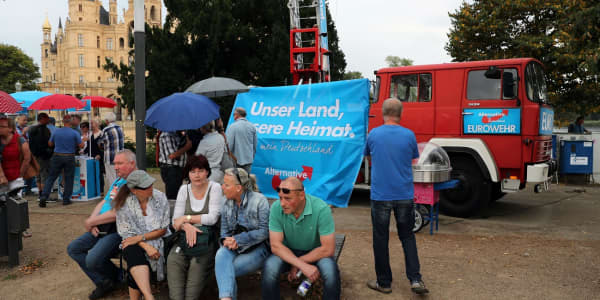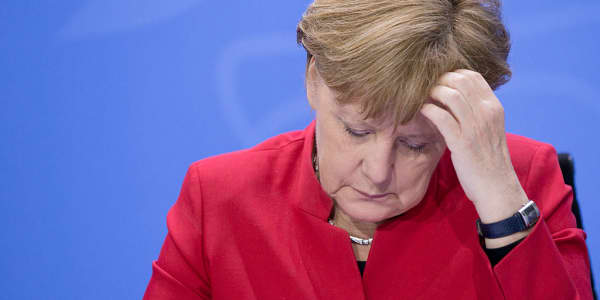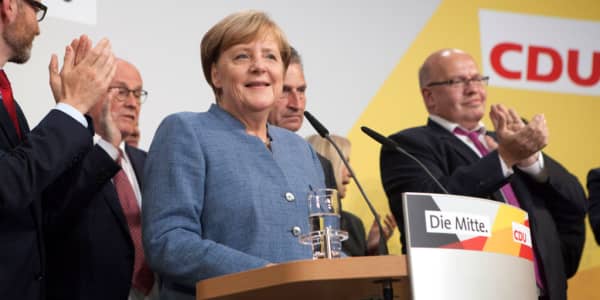
It could be said that the underlying winner of Germany's election Sunday was ultimately the Alternative for Germany (AfD) party, which saw the largest increase in voter share of all of the country's main political parties.
In fact, while the anti-immigrant, anti-euro party saw a 7.9 percentage point increase from the last election in 2013 (the year the AfD was formed), Germany's main parties – Merkel's conservative CDU/CSU alliance and its former coalition partner, the Social Democratic Party (SDP) — both saw their votes fall dramatically.
As the AfD enters Germany's parliament for the first time, here are five things you need to know:
Humble beginnings
Nowadays, the AfD is mainly known for its anti-immigration (namely, anti-Islamic) stance but it was actually founded on an economic manifesto, opposing Germany's policies during the height of the euro zone crisis.
At this time, the party's founders — Alexander Gauland, Bernd Lucke and Konrad Adam — were among a group of economists and industry figures to voice concerns and criticism about the euro zone's sustainability during the crisis, which saw poorer member states' economies "bailed-out" with funds contributed by all member states.
This led to accusations that German taxpayers were essentially paying for the mismanagement of other euro zone economies and led the party to call for the abolition of the euro, a policy it still advocates.
Successes
Since the party's founding in 2013, it has gained in prominence — particularly in former East Germany. So much so that the AfD is now represented in 13 out of Germany's 16 state parliaments – both to the east and west but more predominantly in the former Communist east. The only states it does not have any seats in state parliaments are in a central strip of Germany in Bavaria, Hesse and Lower Saxony.
Although in the 2013 federal election the party did not pass the 5 percent threshold necessary to enter the Bundestag, this year it received 12.6 percent of the vote as its anti-immigration rhetoric has chimed with voters, particularly after the influx of refugees into Germany in 2015 at the height of Europe's migrant crisis.
Policies
Like other populist movements such as UKIP in the U.K. or the Front National in France the AfD has built its political manifesto on a nationalist platform. Although its origins are on an economic level, it has moved towards an anti-immigration stance, reflecting a wider societal and cultural debate in Germany.
As such, its key election themes this year have been anti-immigration, promoting family values, internal security, leaving the euro and promoting German culture.
The AfD website features pictures of German towns and cities with the slogan: "It's about us, our culture, our home, our Germany." The party has used more explicit and controversial slogans and posters too, including those proclaiming "Get your country back!" Others have called for "bikinis instead of burkas" referring to the full-body covering some Muslim women wear, and "Islam does not fit our kitchen" on a poster depicting a piglet, referring to Islam's dietary prohibition of pork.
Leadership
Despite its successes in regional elections, the AfD has had to deal with as much political infighting as political campaigning. One of the party's founding members, economist Bernd Lucke, quit the leadership in mid-2015, heralding a shift to the right under Frauke Petry.
Lucke told Reuters at the time that he was leaving amid rising xenophobia and Islamophobia in the party, as well as pro-Russian sentiment among its members. The final straw was when Lucke lost a leadership contest to businesswoman Frauke Petry, who is still leader of the party, alongside Jörg Meuthen.
Petry oversaw a shift in the party from anti-euro sentiment towards a more anti-immigration stance and has courted controversy for suggesting that German police should be allowed to shoot at illegal migrants trying to enter Germany. Since then, she has also caused a split in the party by saying the AfD should be willing to join governing coalitions, a move many members oppose – including other well-known AfD politicians Alexander Gauland and Alice Weidel.
Bombshell
On Monday, a day after the AfD's election success, however, Petry shocked the party by saying she would not sit in parliament with AfD members and would instead sit as an individual MP for her regional constituency of Saxony, citing a "disagreement over content" within AfD ranks. Her co-leader Meuthen likened her announcement to "dropping a bomb," according to various news reports, and said the move was not discussed beforehand.
Petry's announcement could herald the start of more public infighting for the AfD, with a split growing between more moderate and more extreme members of the party. Hans Jörg Schelling, the finance minister of Austria, told CNBC that the result was not good but also "not a disaster."
"We have a situation in Europe that we have a losing the middle, so we're going to right and left, but we've never had a situation with a far, far-right like the AfD in Germany so that's a very critical situation because nobody knows what their plans are and nobody knows how they'll react in parliament," Schelling said.
Misrepresentation?
Despite the stir caused by the AfD, it is not universally condemned. Sean Corrigan, director of Cantillon Consulting, said the AfD was feared too much and told CNBC that its policies had been misrepresented.
"Let's take the slightly controversial side about what the AfD wants to do about culture and immigration, which has been vastly misrepresented by their opponents, then everything else is small government, direct democracy, low regulation and low taxes, support for the family, no further monolith in Europe but the nation states cooperating… If you read this, how can you call this party far-right?," he told CNBC Europe's Squawk Box.
Meanwhile, Frank-Christian Hansel, parliamentary manager of the AfD in the Berlin State Parliament, told CNBC Monday that the party was "not against refugees but was against migration."
"We have a lot of migration because of economic reasons so our party's position… we don't want to have mass immigration because of economic reasons and this is a point we've always made."





